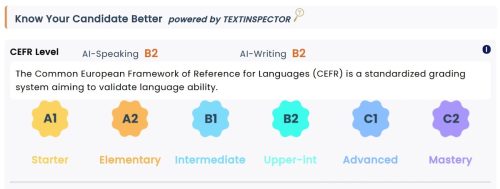How Text Inspector can transform your talent acquisition process
26 September, 2024

In today’s competitive job market, Human Resources professionals have begun turning to text analysis tools (such as Text Inspector) to modernise the recruitment process. These tools are able to streamline recruitment by automating resume screening, assessing language proficiency, and enhancing candidate communication. In this article, we will discuss the plethora of potential uses of Text Inspector to help you find the perfect candidate for your job.
Using Text Analysis Tools for the Recruitment Process
While the benefits of text analysis tools like Text Inspector are clear, it’s important to recognize both the advantages and potential challenges.
Advantages of Using Text Inspector:
- Efficiency and Speed: Text analysis tools can quickly scan through large volumes of resumes, cover letters, and other application materials, identifying key skills, experiences, and qualifications. This significantly reduces the time spent on manual resume screening, allowing HR teams to focus on more strategic tasks.
- Consistent and Objective Evaluation: To reduce the risk of human bias and inconsistencies of manual screening, text analysis tools ensure consistency by applying the same criteria across all candidates. Moreover, these tools can objective assessment of candidate materials, helping to identify the best-fit candidates based on specific job requirements.
- Automating Language Proficiency Assessment: Text Inspector can assess candidates’ language proficiency by analysing their grammar, sentence complexity, vocabulary richness, and other linguistic factors. This is particularly helpful for roles that require strong communication skills.
Disadvantages of Using Text Analysis Tools:
- Potential for Bias: Even though text analysis can reduce human bias, it can also introduce new biases if the algorithms are not carefully designed and tested. For example, if a tool is trained on biased data, it may inadvertently favour certain demographics over others.
- Over-reliance on Keywords: If a text analysis tool focuses too heavily on keyword matching, it may lead to qualified candidates being overlooked when their resumes don’t include the exact terms the tool is programmed to recognize.
- Lack of Human Touch: Automated tools can miss the nuances and context that a human recruiter might pick up on, such as a candidate’s career trajectory or potential for growth, which are often crucial aspects.
Automating language proficiency assessment
Furthermore, Text inspector can automate the assessment of language proficiency by evaluating various aspects of a candidate’s writing. It can immediately analyse metadiscourse markers, vocabulary usage, and overall readability to determine a candidate’s language skills. As a result, Text Inspector automatically rates a candidate’s written communication on the Common European Framework of Reference for Languages scale, providing a standardised measure of their proficiency, saving time and ensuring consistency in evaluating language skills across all candidates. We do recommend Text Inspector is always used in conjunction with expert opinions, as machines are never perfect.
Using Text Analysis Tools for Language Proficiency Assessments
If the role you are looking to fulfil in your company involves communicating with clients, partners or other team members, assessing potential candidates’ language skills becomes a critical issue. However, traditional methods such as interviews or written tests can be time-consuming and subjective. This is where text analysis tools like Text Inspector come in.
How Text Inspector Helps Recruiters Evaluate Language Proficiency:
Text Inspector has been designed to examine written content, which makes it an ideal tool for assessing candidates’ language skills. By evaluating factors such as vocabulary richness, metadiscourse markers, and sentence complexity, it can provide a comprehensive assessment of a candidate’s writing. There are three areas of possible analysis and results:
- Vocabulary Analysis: Text Inspector can identify the range and complexity of vocabulary used by a candidate, giving recruiters insight into their ability to use language effectively in different contexts.
- Spelling and Metadiscourse Evaluation: The tool can automatically look for spelling mistakes in a candidate’s text, as well as analyse metadiscourse markers that show how ideas are connected. This can help recruiters gauge the candidate’s command of language.
- Readability Scores: Text Inspector generates readability scores that reflect how clear and understandable a candidate’s writing is, ensuring their communication style aligns with the role requirements.
By using Text Inspector, recruiters can quickly and objectively evaluate the language skills of candidates, leading to more efficient hiring decisions, especially for roles where strong communication is key.

Integrating Text Inspector in the Recruitment Process
Integrating Text Inspector into the recruitment process can significantly enhance various stages of candidate assessment, from application screening to interview preparation and language proficiency evaluation. Here’s how Text Inspector can be incorporated at various stages of recruitment:
1. Application Screening: Text Inspector can be used to analyse resumes and cover letters for clarity, vocabulary use, and overall language proficiency. By doing so, recruiters can quickly identify candidates who demonstrate strong communication skills, ensuring that only the most qualified applicants move forward in the process.
2. Interview Preparation: Before carrying out interviews, recruiters can use Text Inspector to analyse candidates’ written responses to pre-interview questions. By evaluating language proficiency of the potential candidates’ writing, it provides recruiters with valuable insights into how to tailor interview questions around their communication skills.
3. Language Assessment: If the role you are looking to fulfil requires fluency in multiple languages or advanced writing skills, recruiters can ask candidates to submit writing samples. Then, Text Inspector can assess these samples, yield objective measures of the candidate’s language competency and align these results with the Common European Framework of Reference for Languages (CEFR) levels.
4. Offer Letter Drafting: Once a candidate is selected, Text Inspector can be used to review the language and tone of offer letters, ensuring they are clear, professional, and free of errors. This not only enhances the candidate experience but also reflects positively on the organisation.
By integrating Text Inspector into these key stages, HR teams can ensure a more efficient, consistent, and objective recruitment process, ultimately leading to better hiring outcomes.
Text Inspector CEFR Levels
Being able to communicate in English is undeniably a key skill in today’s globalised job market. The Common European Framework of Reference for Languages (CEFR) is a standardised system for measuring language proficiency, ranging from A1 (beginner) to C2 (proficient). Text Inspector integrates CEFR levels into its language analysis, allowing recruiters to assess candidates’ communication skills against an internationally recognized benchmark.
How CEFR Levels Assist in Language Proficiency Assessment:
- Standardised Evaluation: CEFR levels provide a consistent metric for comparing candidates’ language proficiency. This ensures that recruiters have a clear understanding of each candidate’s communication abilities.
- Role-Specific Language Requirements: Different roles may require different levels of language proficiency. For instance, customer service positions might require B2 level proficiency, while marketing or editorial roles might demand C1 or C2. Text Inspector’s CEFR assessments help recruiters match candidates’ language skills to the specific demands of the job.
- Objective Benchmarking: CEFR levels offer an objective way to measure language proficiency, reducing the subjectivity often associated with language assessments in recruitment.
By applying the CEFR proficiency level assessment to the recruiting process, HR professionals can discover the candidate with the ideal language skills that their potential role requires.
Assessing English level of employees: a SaaS skill evaluation report with Text Inspector
Let’s look at a case study of a company that successfully incorporated Text Inspector into their recruitment process.
One of our customers, a SaaS company that offers skills management resources, integrated the Text Inspector API with their skills assessment software in order to help companies assess the English level of their employees and candidates. Employees and candidates filled out an online written exam and a report was generated in a PDF for HR to assess their results in an easy manner. The company was able to integrate the Text Inspector API (along with other tools) in their SaaS solution to generate a comprehensive PDF report. This is the final result obtained after analysing a written sample.

Therefore, it is safe to say that you can also integrate Text Inspector into your recruitment process, especially if the role to be fulfilled requires language fluency and communication skills, in order to analyse and determine the level of proficiency of your potential candidates.

Call to Action for HR Professionals
As the recruitment landscape becomes increasingly competitive, it is essential for HR professionals to take advantage of tools that can enhance their processes and lead to better hiring outcomes. Text Inspector offers a powerful solution for automating and standardising language proficiency assessments, ensuring that your organisation attracts and retains top talent with strong communication skills.
If your organisation is looking to streamline the recruitment process and improve candidate assessments, it’s time to explore Text Inspector. This powerful tool helps HR teams save time, reduce bias, and hire top talent with strong communication skills.
Contact us today to learn more about how Text Inspector can be integrated into your recruitment process and start making more effective, data-driven hiring decisions. Don’t let language proficiency go unchecked—let Text Inspector ensure your candidates meet the highest standards.
References
- Heymans, Yuma. “NLP Tools for Recruitment: Understanding Candidate Language.” HeroHunt.ai, 26 April 2024, https://www.herohunt.ai/blog/nlp-tools-for-recruitment.
Accessed 02 September 2024. - Naveed, Anna. “Beyond Keywords: Text Analysis for Smart Skills Matching in the Age of AI.” Web.hr, 08 March 2024, https://web.hr/blog/skills-matching-age-of-ai. Accessed 01 September 2024.
Contributed by Victoria Martínez Mutri
Victoria is a CELTA-certified English as a Foreign Language teacher with a background in Translation from Buenos Aires, Argentina. Fascinated by language since an early age, she’s particularly interested in the fields of Applied Linguistics and Sociolinguistics. She’s been researching and writing about gender-inclusive language since 2018. After graduating, she would like to obtain a Master’s Degree in Linguistics at a foreign university.
Share
Related Posts

The Most Important Languages to Learn for Business
13 November, 2024
Discover the 9 most valuable languages to learn for business success. From English and Mandarin to Spanish and Arabic, boost your career and expand your market reach.
Read More ->
BBC news feed demo
24 June, 2022
Text Inspector’s Analysis of Highlights from the BBC News Feed The BBC has long been […]
Read More ->
How Text Inspector can transform your talent acquisition process
26 September, 2024
In today’s competitive job market, Human Resources professionals have begun turning to text analysis tools […]
Read More ->